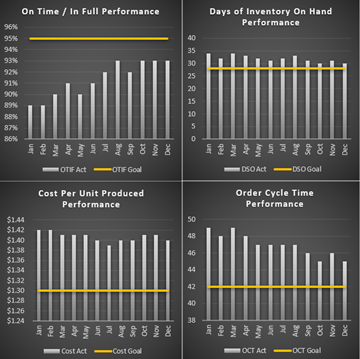Supply Chain Value Hat Trick: Service, Cost & Cash
How can supply chain add value to the business?
Let’s start with a few definitions.
Definition of Supply Chain
A supply chain is the system of people, assets, activities, and information involved in the production and delivery of goods and services to customers.
Definition of Supply Chain Management
Supply chain management is the strategy and execution to balance service, cost, and working capital cycle (the time it takes from when you pay for materials, production, and inventory and when you receive payment).
Understanding the Value of Supply Chain in Your Business
Start by asking yourself these provocative questions to understand better how can supply chain adds value to the business.
- What do your service levels to your customers need to be in order to maintain and grow?
- How much do you spend on all of your Supply Chain activities and how much is unnecessary? Including:
- Transportation, Storage, Handling, Packaging, Manufacturing, Personnel/overhead
- Waste: Expediting, Errors, Inventory Shrink, Production Downtime, Over-Processing, etc.
- How much money/credit do you have tied up in Inventory, Receivables, and Payables?
If you’re unsure of the answers, Waypost Advisors’ supply chain consulting can help. Consider this real-world example.
A Food Manufacturer’s Business Value of an Effective Supply Chain
Goal: To Ensure Their Best Return on Capital Invested
A privately-held, $270 million food manufacturing company wanted to ensure they were getting the best return on their capital invested. They needed to understand how their key priorities for improvement aligned with their growth strategy.
The business’s basic metrics included:
- Profitability
- Number of customer complaints
- Cost per unit sold
As well as a few others. But they didn’t really have a great idea of where they should focus improvement and what would be the value.
Identifying Their Supply Chain Drivers of Success
With the help of our supply chain advisor, the food manufacturing company was able to understand the details of the key drivers of their business’s success.
They designed and implemented key performance metrics such as:
- On Time / In Full Shipment & Delivery to the customer
- Perfect Order Index – the number of orders shipped without an incident
- Days of Sales On-Hand (Inventory)
- Inventory At-Risk (of obsolescence)
- Cost per Unit Produced & Cost per Unit Shipped
- First Time Right (% of items produced to-spec without needing rework or further processing)
- Order Cycle Time (how long it took from order receipt to invoicing)

Improving Business Value Within 6 Months
With this information, the food manufacturing company was able to see how they were performing against the areas that were critical to their success, such as:
- Servicing the customer
- Cost of goods
- Minimal working capital requirements
They created a program to measure the inputs and outputs of capital projects. The program included conducting a root-cause analysis when they did not meet their targets to ensure the effectiveness of their capital investments.
They also implemented continuous improvement and capital projects to address issues such as:
- Late shipments
- Labor overtime
- Production downtime
- Excessive inventory
Within 6 months, the food manufacturing company was able to:
- Improve their on-time shipment performance by 3%
- Drive their operating costs down by 1.7%
- Reduce their cash conversion cycle by 4 days
How can supply chain add value to YOUR business?
This is the experience our advisors can bring you!
Our advisors understand the value an effective supply chain can bring to your business. Let’s talk about your supply chain improvement opportunities! Schedule a 30-minute free consultation with our supply chain advisor to learn more.
